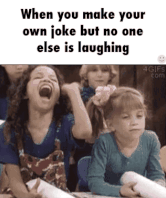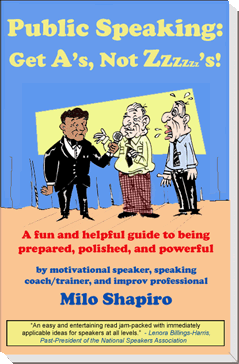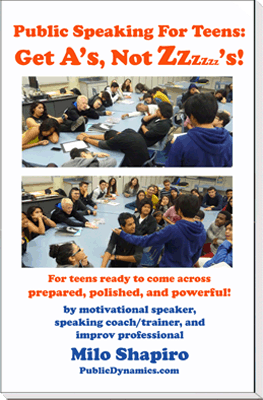
Cavett Roberts, founder of the National Speakers Association, was once asked by an audience member (a professional speaker
herself), "I'm not really a funny person, so do I HAVE to use humor?"
Without hesitation, Cavett replied, "No, no, no. You don't have to
use humor. Unless you want to get paid." After a pause to
catch his meaning, the whole audience laughed loudly, including her, as
they got his point.
Case in point: A potential client called
me, inquiring, "I've been all over your website and I like what I see
about you as a speaking coach, but I also see that you're 'The Improv
Guy'. I'm giving an hour-long presentation about Lou Gehrig's
Disease, so there's no room for humor in this
program. Got it?"
"Gotcha," I responded, echoing the fact
that I knew where he was coming
from, not necessarily my agreement. I knew there were a half-dozen
other more important issues on his plate, so humor was low on my
agenda. But not off the table in my mind.
John met with me and, over the course of several
visits, we rearranged much of his program to improve the flow, re-did a
PowerPoint that was going to yield snoozing, worked on simplifying his
wording, and lifting his delivery energy. With each visit, he
became more excited.
On his fifth visit, he burst in and said, "Okay, I can't wait to hear
what today's focus is going to be! What is it?"
I smiled broadly and stated, "Humor!"
His face hit the floor. "You gotta be
kidding me! How clear was I that
there's no [click
here to read the rest of the story]
Public Speaking Tip of the
Day
Try a fill-in-the-blank style handout with
your presentation instead of giving the
audience everything up front (making you
superfluous) or having them just take notes
(and potentially missing info you want them
to leave notated).
For instance, in my keynote speech on public
speaking skills named after my book, one of
the notes on the handout says:
Never underestimate the power
of _____________________.
The question of what goes in the blank gets
people thinking and when I say the sentence
with the missing word, they get that jolt of
adrenaline that says, "Aha! That was
one of the answers!" and they get to do
something slightly physical to keep
themselves engaged.
The answer, by the way, is "story".
And then I expand upon why stories make such
a difference in a speech.
One of the many tips in
"Public
Speaking:
Get A's, Not Zzzzzz's!"

Or my Amazon #2
BestSeller for the next generation:
